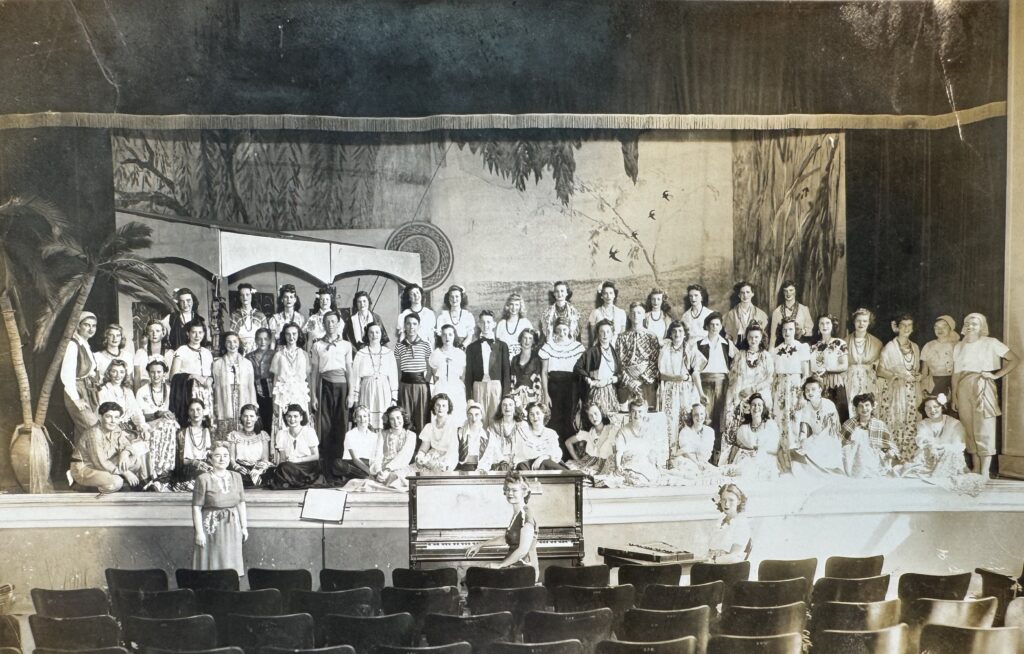Feature image: young performers on the Friday Musicale stage, c. 1950, courtesy Jacksonville History Center.
by Elaine Slayton Akin, RAP Archivist
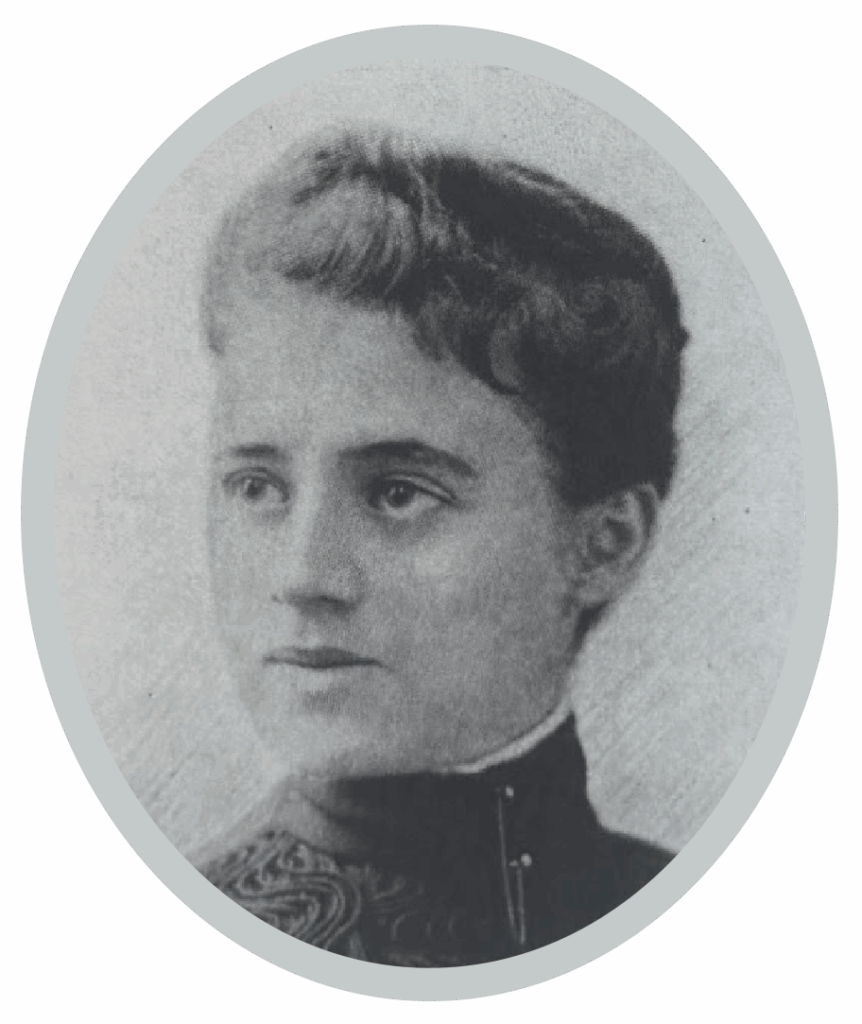
“Call it Jacksonville’s Musical Mecca… arguably the cornerstone of [our city’s] music scene,” Mark Faulkner declared in a 2000 Florida Times-Union article celebrating Friday Musicale’s nearly 80 years at 645 Oak Street. The organization, however, has roots as far back as 1890, meeting on Friday afternoons in the downtown home of founder Claudia L’Engle Adams at 37 Monroe Street prior to the Great Fire of 1901. From 12 charter members, who adeptly pivoted after the
Claudia L’Engle Adams c. 1890, courtesy Jacksonville History Center.
unexpected and early death of their founder in 1895, in a parlor room to decades of various leaders and locations and an arson devastation in 1995, the resilience of Friday Musicale is an allegory for the countless women who found power in society by taking up space in Jacksonville history through cultural development and for the transcendent quality of music as a conduit for creative self-expression for all.
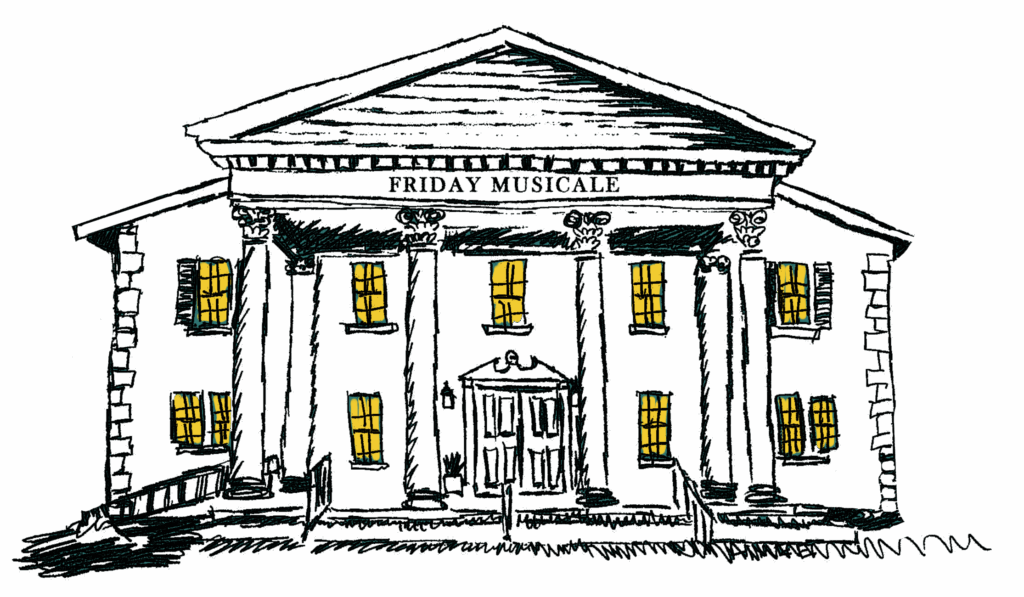
Present-day Friday Musicale illustration, courtesy Friday Musicale.
Not unlike Caroline Astor and Alva Vanderbilt’s legendary championing of the Academy of Music and the Metropolitan Opera, respectively, in the Gilded Age of New York, the Ladies’ Friday Musicale (its original name until 1922) of Jacksonville provided an outlet for elite
white women of society to lead in the fine arts. Parallel to their male counterparts in more “serious” business endeavors, these women, such as Adams (above), wife of lawyer and U.S. Commissioner Charles S. Adams, and her cousin Caroline “Lina” Hallowes L’Engle, wife of banker Bion Hall Barnett, Jr. (later Bank of America)—both nieces of La Villa’s first mayor Francis Fatio L’Engle, were afforded influence in “trivial” matters; the difficulty in finding all the Musicale founders’ first names is a testament to the “Mrs. Husband’s Name” problem and the limits of women’s power. In reality, it’s the Musicale founders and other women like them from such movements as the Woman’s Club, Junior League, Daughters of the American Revolution, and Colonial Dames whom we have to thank for the preservation of our culture’s heritage.
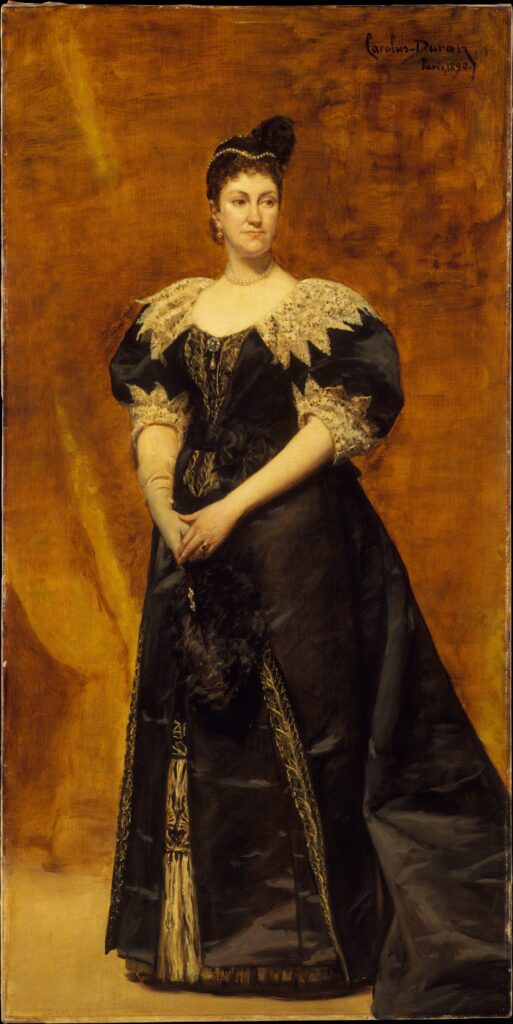
Caroline Schermerhorn Astor, Carolus-Duran, 1890, courtesy The Metropolitan Museum of Art.
As a side note, if the surnames L’Engle and Fatio sound familiar, it is because they are steeped in Florida lore. Claudia and Lina’s ancestor Viscount Francis Philip Fatio, Sr., of Switzerland secured a British crown grant of 10,000 acres in the newly acquired East Florida colony and landed in St. Augustine in 1771. Lina especially followed in her great-great-grandfather’s footsteps to advocate for the conservation of Florida’s forests, warranting a special bench plaque commemorating them both. Presented in 1935 by the Colonial Dames, of which Lina was a member, to Rollins College in Winter Park, it also honored the friendship between Lina’s daughter Madeleine Camp and Alfred Jackson Hanna, the college’s history department chair.
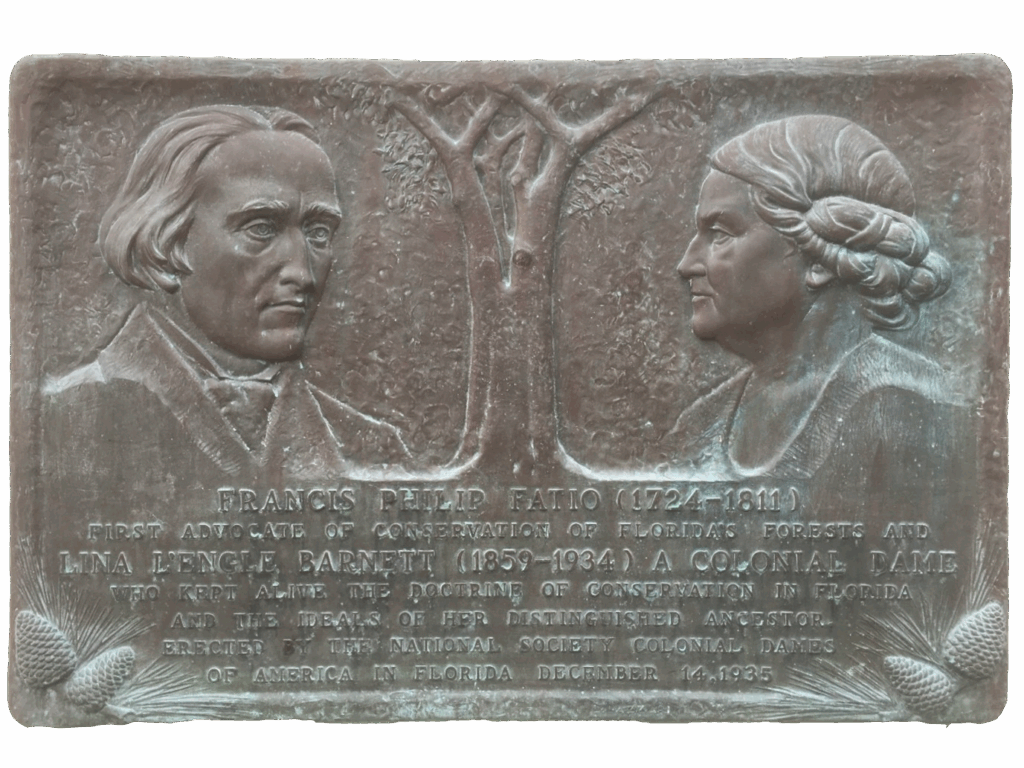
Furthermore, the Ximenez-Fatio House in St. Augustine was stewarded by Louisa Fatio, granddaughter of Francis Philip Fatio, Sr., and her family from 1851 until after her death, when the Colonial Dames purchased it in 1939 and still own it to this day.
Bronze bench plaque honoring Francis Philip Fatio and Lina L’Engle Barnett, 1935, Rollins College.
The Musicale’s long-time home in Brooklyn began with a tract of land, “Dell’s Bluff” south of McCoys Creek, purchased by Miles Price from the James Winter estate in 1868, which included a parcel occupied by Black Union troops to keep order during Reconstruction. By 1919, the property on Oak Street between present-day Rosselle Street and Peninsular Place had become the all-girls Concordia School (coincidentally the alma mater of musical prodigy and Rollins graduate Frances Sawyer Sligh, who would later serve in leadership for Friday Musicale in adulthood), built by prolific architect V. Roy Kooker.
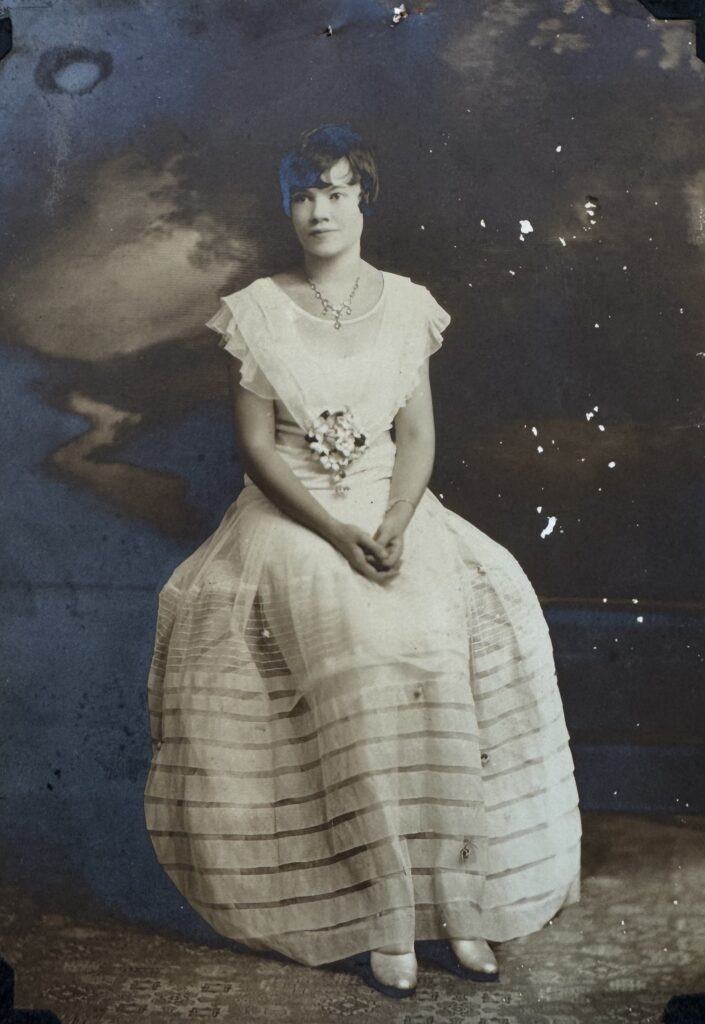
Musician Frances Sawyer Sligh by unknown photographer, c. 1930, courtesy Jacksonville History Center.
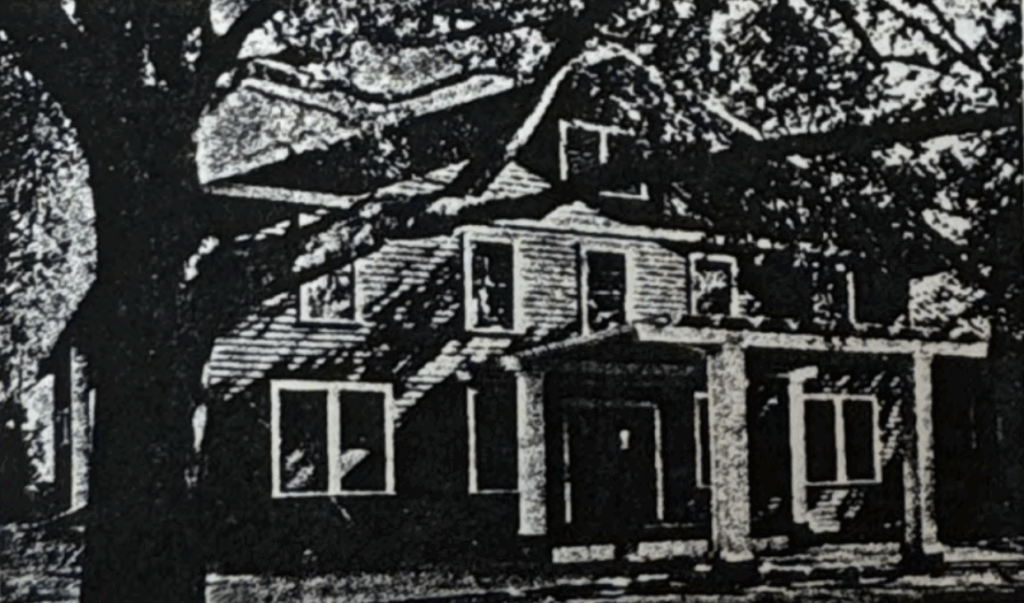
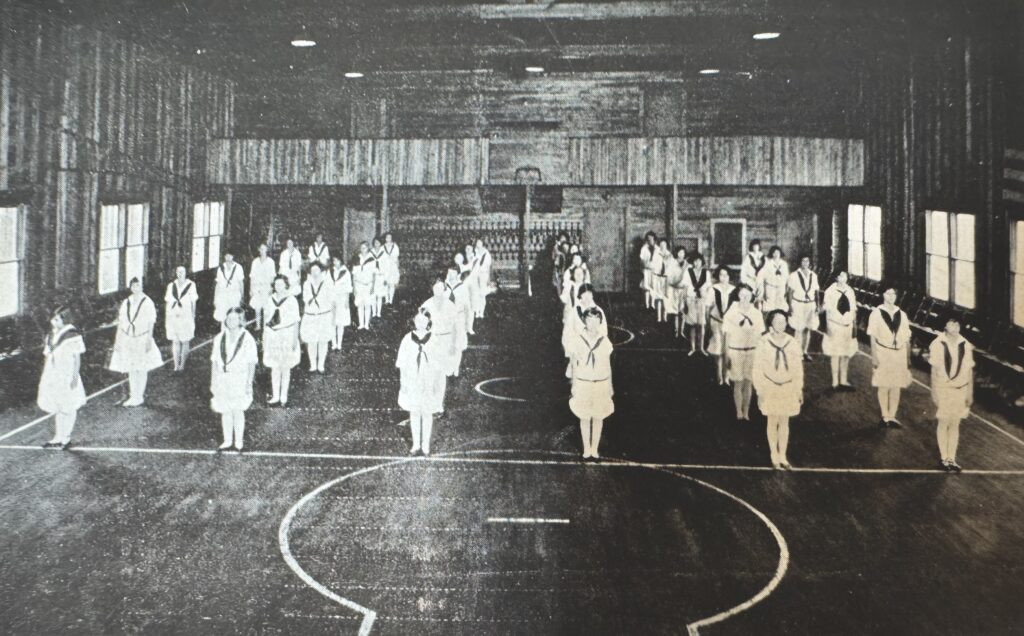
Left to right: Concordia School gym exterior, c. 1920, courtesy Florida Publishing Co.; Concordia School gym interior, 1923, courtesy City of Jacksonville.
By 1925, the school had closed, and Friday Musicale purchased its barn-like, wood-shingled gymnasium as its headquarters in 1929. In 1945, architect Russell Seymour was hired to remodel the building into a formal, neoclassical concert hall with white-painted bricks, a pedimented portico, and four prominent Corinthian columns. Persevering an arson fire set to the Concordia Ballroom in 1995 through resourceful and swift fundraising, the Musicale was also gifted by Helen Lane an extraordinary historic Victorian a block over at 630 May Street. In the 1970s, Lane bought and restored the old “Princess Royal,” once owned by travel agent Willis E. Gerow and his wife Frances, according to the 1904 Jacksonville City Directory.

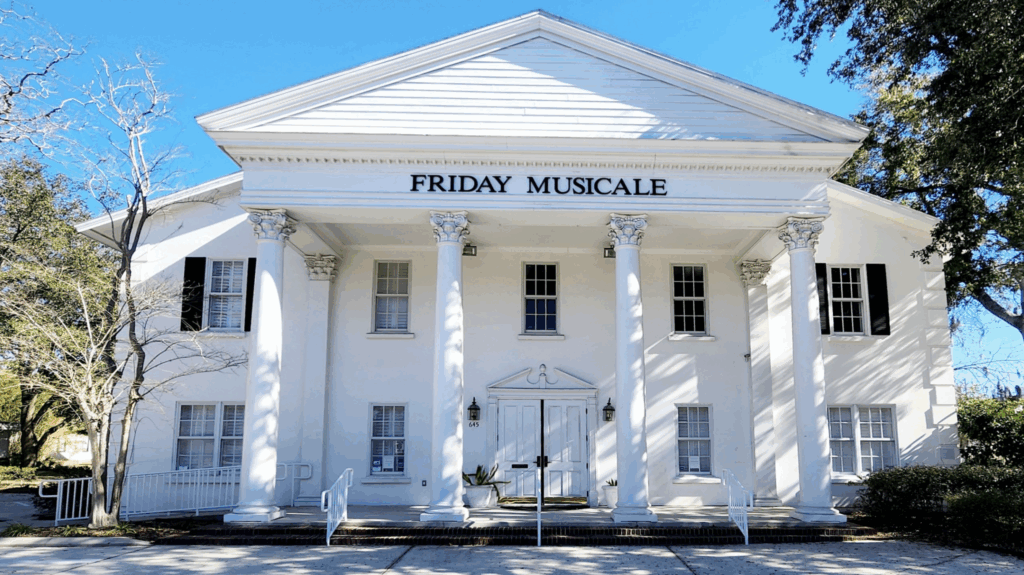
Left to right: Friday Musicale after the 1995 fire, courtesy Florida Times-Union; present-day Friday Musicale, courtesy Friday Musicale.
True to the reputation established in the 2000 Times-Union article and many others charting the saturation of Friday Musicale into the assorted facets of cultured Jacksonville, the Musicale has pivoted to reach all ages, genders, styles, and backgrounds over the years. In its 1914–1915 season, Friday Musicale formed the “Junior Department” of orchestral and choral student members, later becoming the Junior Friday Musicale in the ‘40s. In 1922, the Musicale’s bylaws dropped “Ladies’” from the organization’s title to recognize its contributions by men, primarily as conductors (the preeminent George Orner and Henry Cornely, Jr., for example), performers, and members of brotherly entities such as the American Legion, which co-sponsored the first Opera Week in Jacksonville circa 1927.
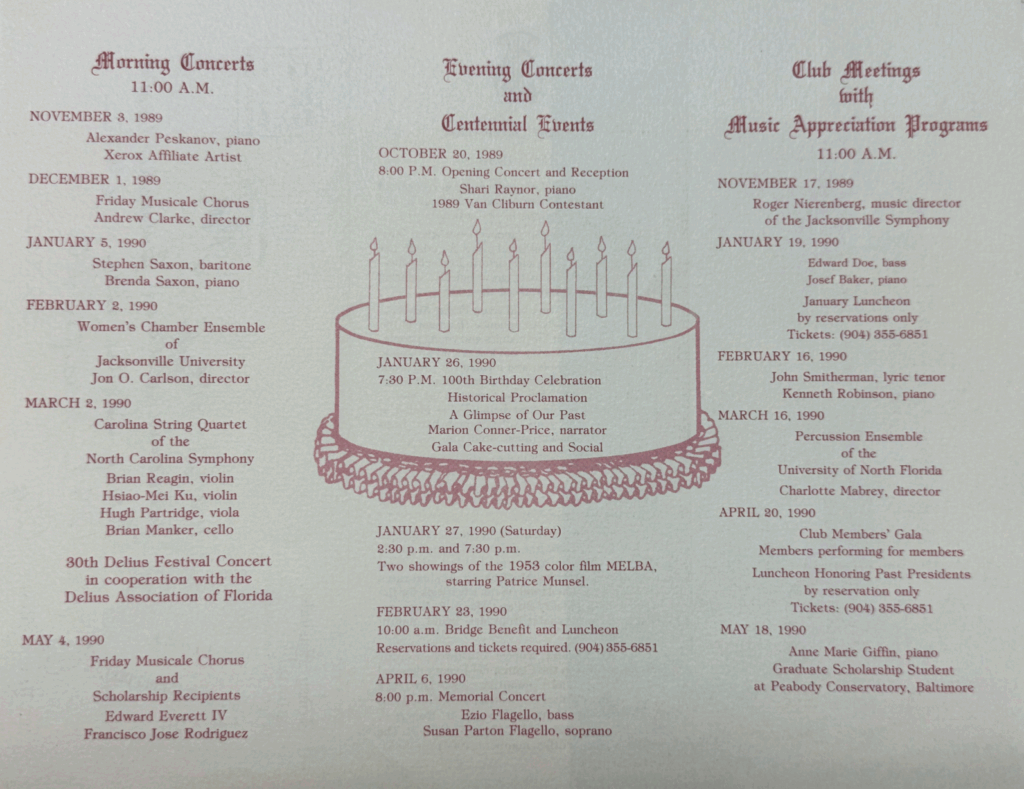
Friday Musicale 100th Birthday Celebration program, January 26, 1990, courtesy City of Jacksonville.
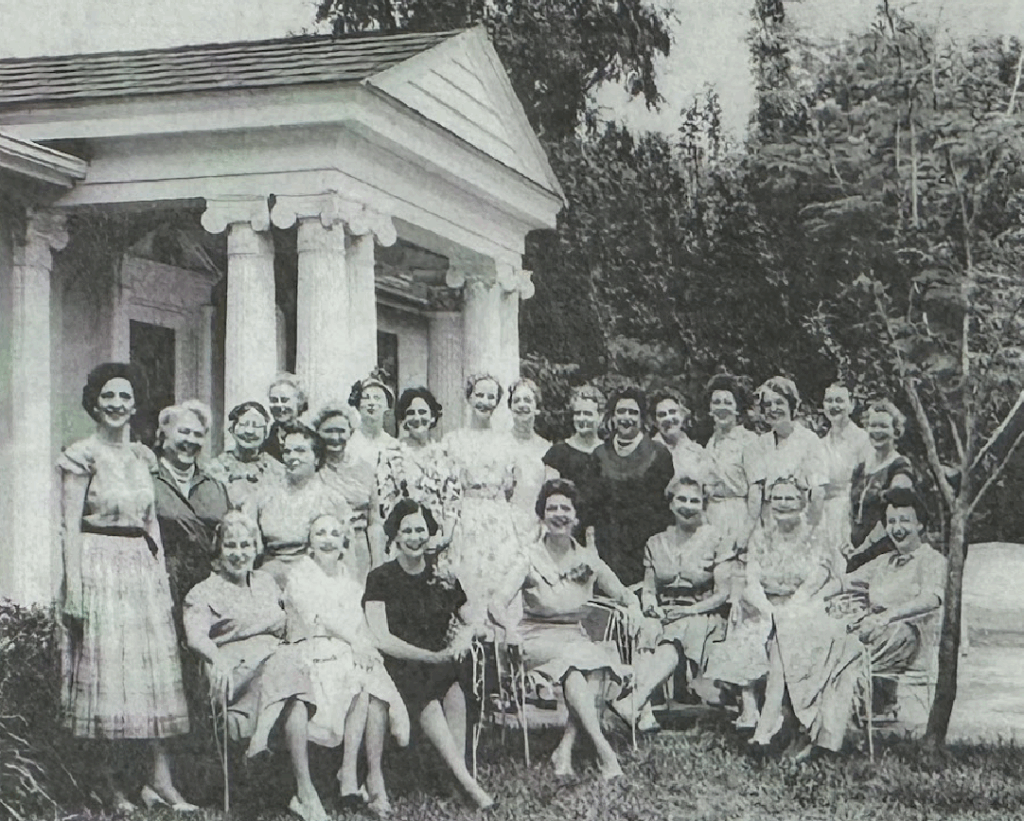
During the scarce conditions of World Wars I and II, the Musicale merged with the Florida State Symphony and then the City Department of Recreation, renamed the Jacksonville Philharmonic. By the 1950s, the Musicale had regained its original name in post-War abundance, and 1950–1951 Musicale president Greta Challen Berg became a founding member of another Jacksonville music
Friday Musicale board members 1958–59 at the home of Eleanor King, courtesy Resident News, September 2017.
staple–the Jacksonville Symphony. Friday Musicale has famously hosted musical lectures, festivals, programs, and concerts by some of the world’s most acclaimed artists: singer Nellie Melba, Metropolitan Opera star Eleanor LaMance, violinist Fritz Kreisler, Russian composer and virtuoso pianist Sergei Rachmaninoff, soprano Risë Stevens, pianist Mordecai Shehori, duo pianists Joanne Rogers and Jeanine Morrison, world-famous baritone Simon Estes, Chinese double bassist Daxun Zhang, Parisian pianist Laurent Boukobza, and tenor Stephen Ng.
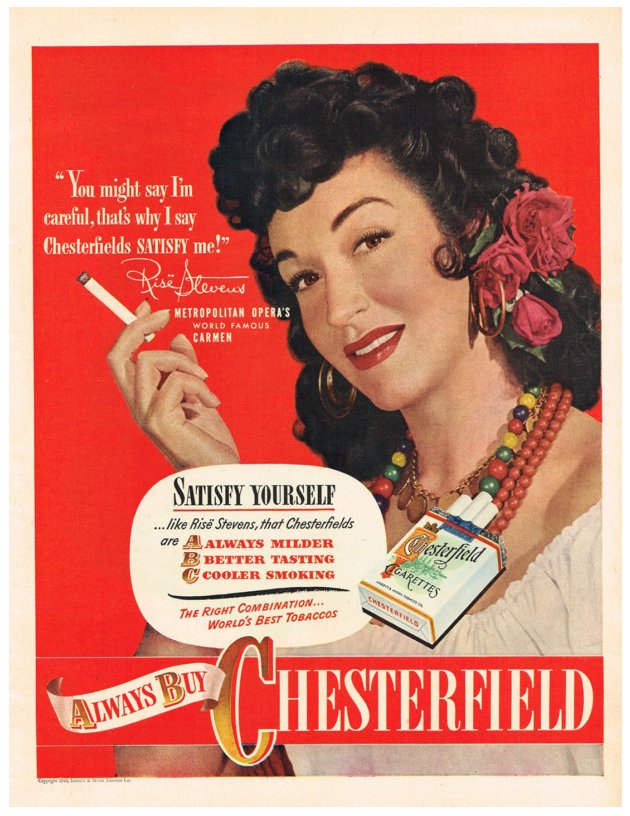
Soprano Risë Stevens in Chesterfield ad, c. 1950, courtesy National Endowment for the Arts.
Much like the local school district, Friday Musicale was slow to adopt the integration of people of color into its fold of members and performers after the Civil Rights Act of 1964. Ironically, the Musicale staunchly supported the music of English composer Frederick Delius, who came to the St. Augustine area in 1884 to manage his father’s orange grove. Not particularly musical before, Delius’s creative spark is said to have been set by the songs of the enslaved African-Americans working his property. “He seems to have eschewed life as a plantation owner for a musician’s life and wrote at least one opera, Koanga, that is uniquely unpleasant in highlighting not just the appropriated music, but the white perception of Black Floridians’ lives and culture,” shared Daniel Stark, current Friday Musicale Executive Director. Nonetheless, this appropriation and subsequent fame resulted in a regional festival beginning in 1961 through the early 2000s, celebrated by the Musicale and other social power players.
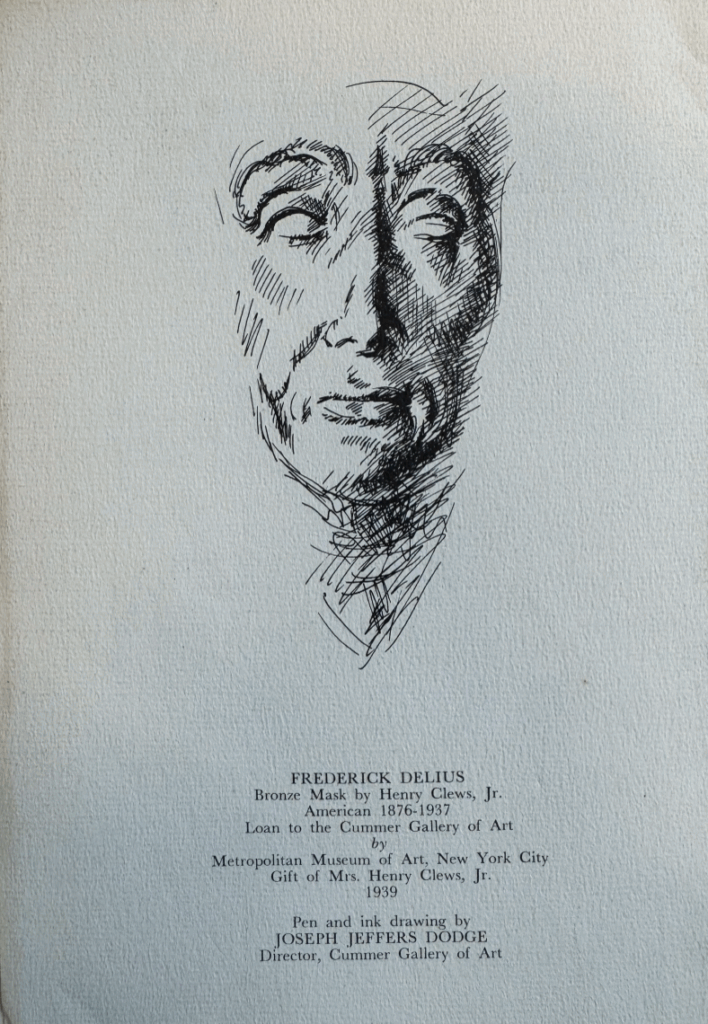
Exacerbating Delius’s questionable muses, it has long been suspected that he fathered a child with a Black enslaved woman named Chloe working his plantation. As the Times-Union covered in the 1980s, the British violinist Tasmin Little even visited Florida herself to seek any Delius descendants. It’s believed that Delius tried to meet the child in his own lifetime, but Chloe had disappeared with the child to keep her or him safe. Delius was allegedly “tormented by a deep sense of loss,” which informs the “roots of much of [his] musical language and his particularly yearning intensity.”
Delius Festival program cover, 1963, courtesy Jacksonville History Center.
Eventually, however, a more diverse representation of musicians began to emerge in 1970 with Ecuadorian pianist Allegria Arce, and its programming continues to reflect the Musicale’s commitment to promoting inclusion and diversity with recent performances by Tivon Pennicot, Dunwoody Murvil, Ballake Sissoko, The String Queens, and many others. Though the challenges of urban development and the severance from Riverside with the construction of I-95 and the Fuller-Warren Bridge have caused some setbacks, Friday Musicale continues to push the boundaries, literally and figuratively speaking, embracing its in-between position that covers everyone.
This year’s RAP Music Tour proudly presents artists who embody the ambitious, passionate spirit of Friday Musicale. “With backgrounds in engineering, music, marketing, web design, yoga, and more, the musicians in the unusual quintet Sonofarious are as eclectic as their repertoire,” describes the Fernandina Observer (2023). Members Scott Kessler, Marcus Yew, Brenda Kayne, Nora
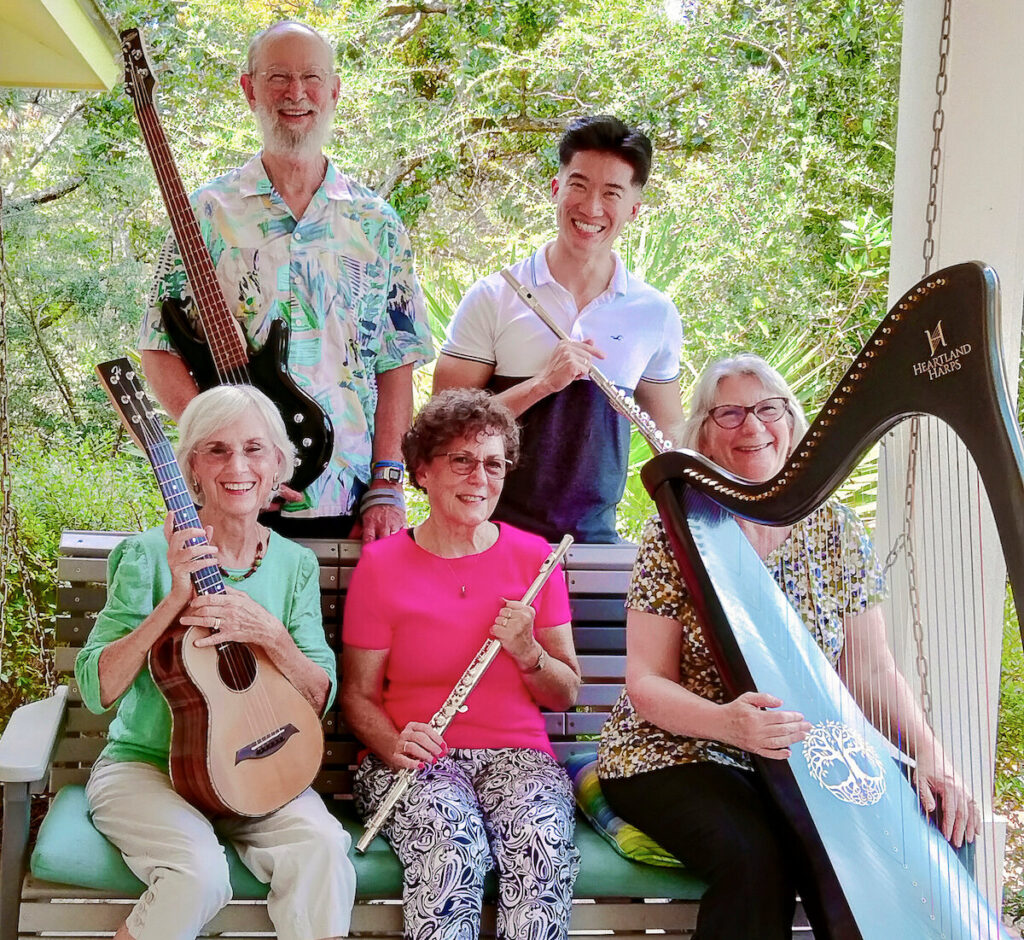
Sonofarious, 2023, courtesy Fernandina Observer.
Wittman, and Munsell McPhillips organized eight years ago and play instruments such as a guitar, harp, guitalele (a guitar-ukulele hybrid), flute, and others to produce original music that is “mostly classical, traditional, and folksy with contemporary surprises.”
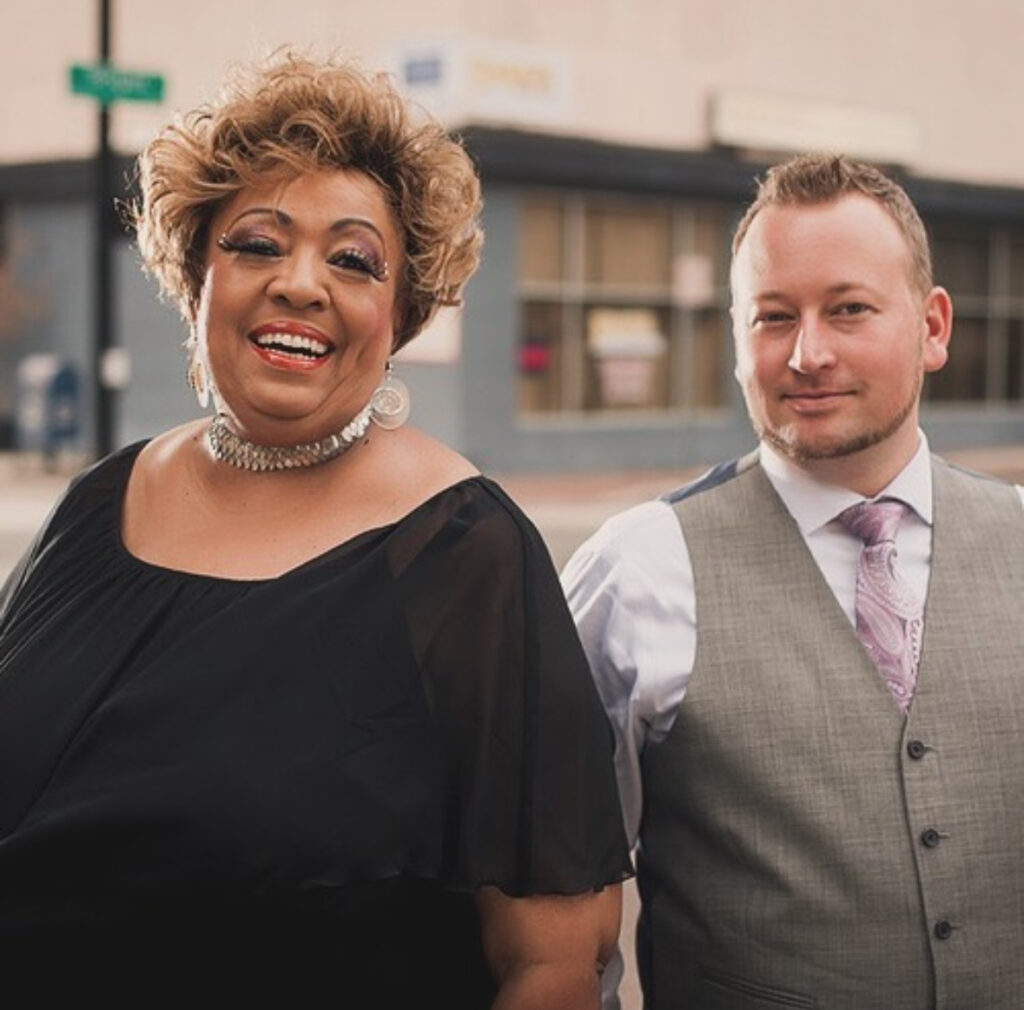
Pianist Joshua Bowlus and saxophonist John Ricci are a long-time musical duo whose work explores “beloved composers and musical legends [such as Duke Ellington and Billy Strayhorn] through the lens of an intimate dialogue between two instrumentalists. The wide-open space of [this] duo allows for harmonic and rhythmic playfulness to abound, in a performance that is up close and personal” (Blue Jay Listening Room).
Joshua Bowlus with Linda Cole, c. 2020, courtesy John Ricci.
Both Bowlus and Ricci are well-known musicians in other bands and in their respective jazz circles, collaborating with major players, including vocalist Linda Cole (related to Nat King Cole) and Motown superstars The Temptations.
Finally, Louis Goldstein, Oberlin-educated pianist and retired Wake Forest University music professor and recipient of the Jon Reinhardt Award for Distinguished Teaching in 2013, will perform American-born, Canadian composer Caitlin Smith’s “Nocturnes and Chorales” (2013), followed by
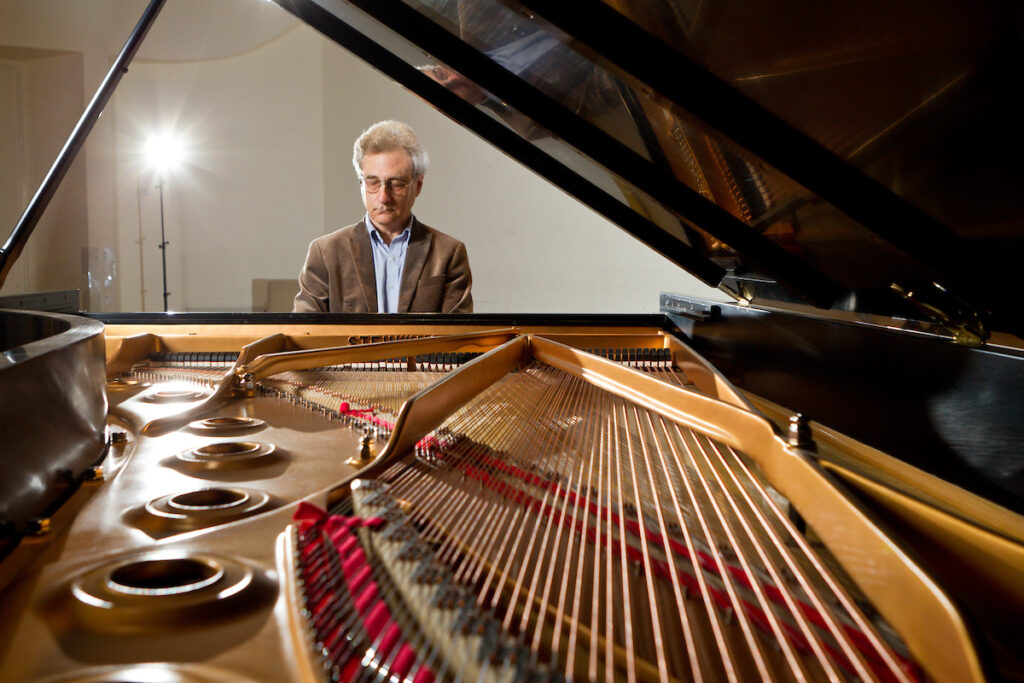
Louis Goldstein, c. 2020, courtesy Wake Forest University.
Barak Perelman’s “Blue, Orange, Gray, White” (21st century). Goldstein is known for his expressive arrangements of the traditional Haydn and Schumann, but also as a pianist “deeply committed to performing music of our own time,” such as John Cage or Morton Feldman, according to the Wake Forest website. He also enjoys interdisciplinary collaboration, melding music with art, history, and literature: the way life really plays out–simultaneously, not one thing at a time.
Warmest thanks to Daniel Stark and Owen Giulianotti of Friday Musicale for their generous collaboration and contributions to the continued research of the organization’s history, and to the pioneering founders of the Ladies’ Friday Musicale:
Claudia L’Engle Adams
Lina L’Engle Barnett
Dorothy Stringfellow Burwell
Ruth Greenleaf Douglas
Elizabeth “Bessie” Gale
Margaret McClorey Pace
Isabelle Strawn Perry
Amelia Kittrell Shields
Julia Sherwood Selkirk
Marietta Williams McLaurin
Mrs. John T. Walker
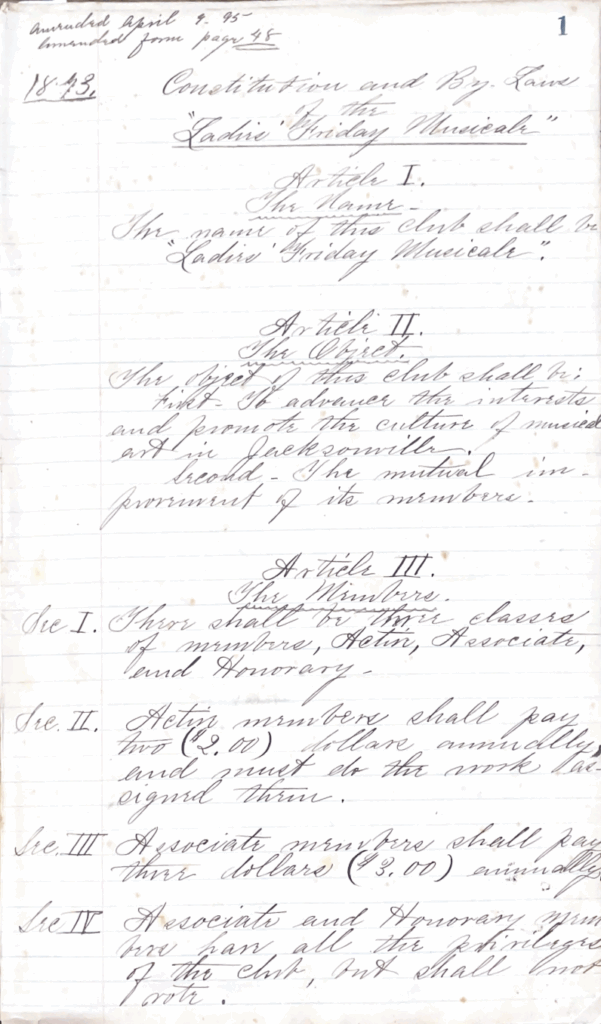
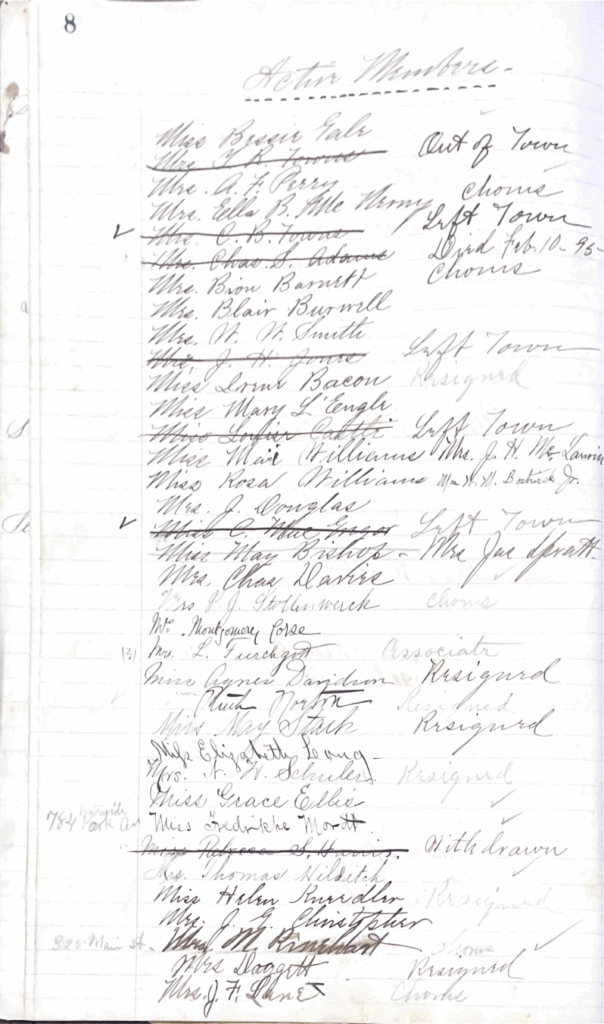
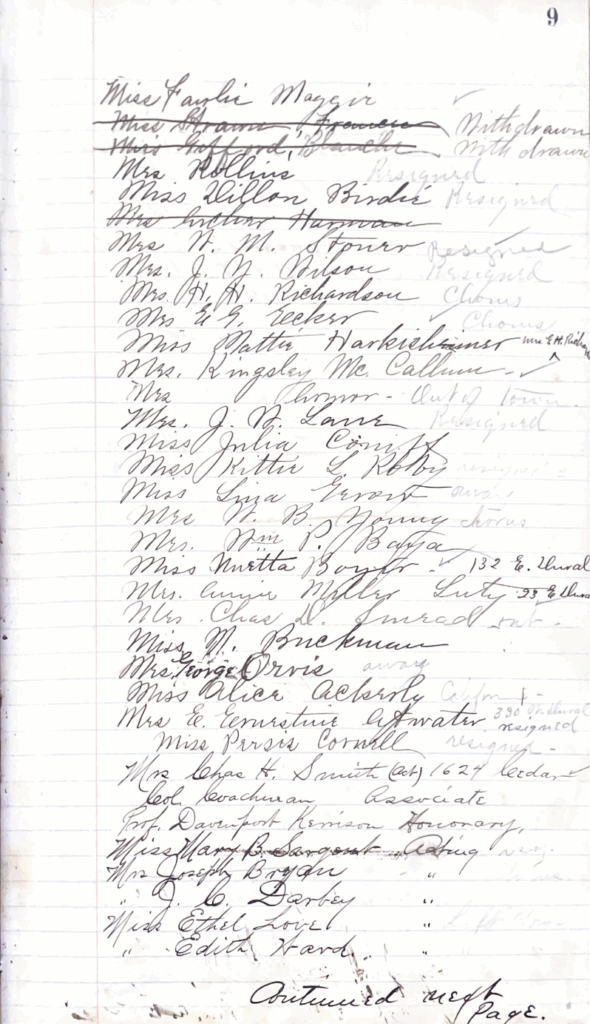
Friday Musicale club minutes, 1893, courtesy Friday Musicale.
